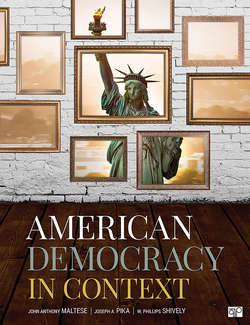Читать книгу American Democracy in Context - Joseph A. Pika - Страница 77
На сайте Литреса книга снята с продажи.
Article I: The Legislative Branch
ОглавлениеBecause legislators are the representatives of the people, the framers thought of the legislative branch as being the most important and presented it first (see Figure 2.5). Article I opens by stating, “All legislative Powers herein granted shall be vested in a Congress of the United States, which shall consist of a Senate and House of Representatives” [emphasis added]. In other words, Congress is limited to those powers given to it by the Constitution. Those powers fall into two broad categories: enumerated powers and implied powers.
Description
Figure 2.5 Confidence in Government and American Institutions
The framers thought that Congress would be the most important governmental institution. How do people feel about it today, based on the findings shown here?
Source: “Confidence in Institutions,” Gallup, 2019, https://news.gallup.com/poll/1597/confidence-institutions.aspx
Enumerated powers are those powers specifically listed. Most enumerated powers are in Article I, Section 8, which contains a laundry list of specific powers given to Congress, including the power to impose and collect taxes, to borrow money, to regulate commerce, and to declare war. Some of these powers were lacking under the Articles of Confederation, notably the power to collect taxes and regulate commerce. Legislative powers not given to Congress, and not covered under implied powers, were presumably retained by the states, a presumption that was made explicit by the Tenth Amendment.
enumerated powers Powers specifically listed in the Constitution, such as congressional powers outlined in Article I, Section 8.
Implied powers are those authorized by the “necessary and proper clause” of Article I, Section 8, Clause 18. The necessary and proper clause (discussed in Chapter 3) expands the enumerated powers by saying that Congress has the power to “make all Laws which shall be necessary and proper for carrying into Execution the foregoing Powers, and all other Powers vested by this Constitution in the Government of the United States, or in any Department or Officer thereof.” This clause is sometimes also referred to as the elastic clause, because it serves to expand Congress’s power. The controversial question of how much the clause can—or should—expand Congress’s power is discussed in more detail in Chapter 3 (see also Figure 2.6).
Description
Figure 2.6 Does the Federal Government Have Too Much Power, Just Enough, or Too Little Power?
What does this figure tell us about how Americans view the power of the central government today? Are the concerns expressed in this poll valid?
Source: “Government,” Gallup, 2018, https://news.gallup.com/poll/27286/government.aspx
Article I, Section 9 places certain specific limits on the power of the national government. For example, it prohibits Congress from passing a bill of attainder (legislation declaring one or more people guilty of a crime) or ex post facto laws (those that retroactively criminalize behavior), limits when Congress may suspend habeas corpus (a recourse for unlawful imprisonment), and—in the so-called emoluments clause—prevents any government official (in any branch) from receiving any gift, payment, or items of value from a foreign state or its representatives without the consent of Congress.
Finally, Article I, Section 10 lists the powers that are withheld from the states. For example, states are forbidden to enter into treaties with foreign nations, coin money, or impose duties on imports and exports without the consent of Congress.
